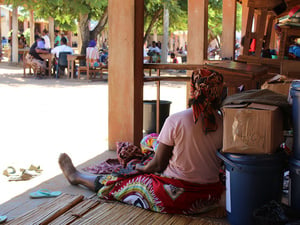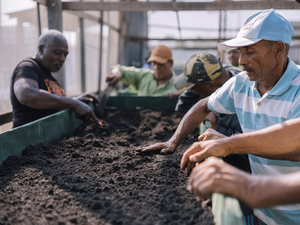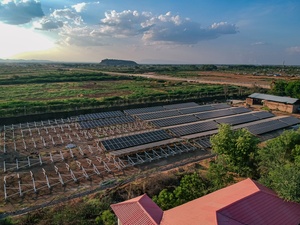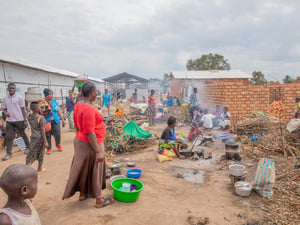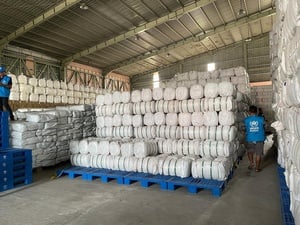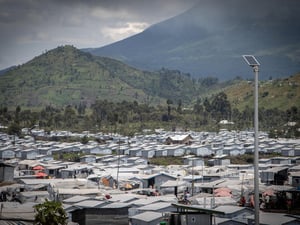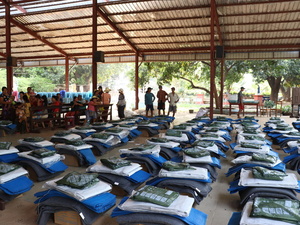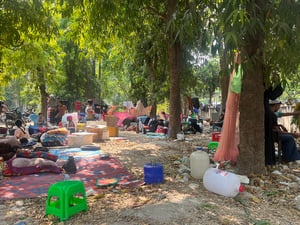UNHCR strengthens support to the most vulnerable affected by floods in Brazil and other regions
UNHCR strengthens support to the most vulnerable affected by floods in Brazil and other regions

Refugees are housed in temporary shelters following devastating floods in Brazil's southern Rio Grande do Sul state.
GENEVA – Almost one month after the start of heavy rains in Brazil’s southern state of Rio Grande do Sul, UNHCR, the UN Refugee Agency, is expanding its response with national authorities to meet the needs of the most vulnerable – including 43,000 refugees and other people in need of international protection, mainly Venezuelans, Haitians, and Cubans along with communities hosting them.
The floods are the biggest climate-related disaster in Southern Brazil and have caused 163 deaths and displaced 580,000 people. More than 65,000 are still in temporary accommodation centres; 93 per cent of the cities and towns in Rio Grande do Sul have been affected.
An estimated $3.21 million is needed to support UNHCR’s response, including financial assistance to affected individuals and essential relief items.
A team specialized in shelter management, documentation and the prevention of gender-based violence has been mobilized to the disaster areas and is coordinating the reception of relief items dispatched by UNHCR. The team is also providing technical assistance to improve the running of shelters, especially in Porto Alegre, the state capital.
The first Refugee Housing Units (RHUs) and sleeping mats arrived in the affected area last Monday, from UNHCR’s warehouse in Boa Vista. Other items like jerrycans, backpacks, adult diapers, tarpaulins, solar lamps, mosquito nets and sanitary and hygiene kits are on their way to Rio Grande do Sul. More items are being dispatched from UNHCR’s stocks in Colombia and Panama.
UNHCR and the International Organization for Migration (IOM) are visiting shelters to survey refugees, those in need of international protection and migrants to assess their needs and support the most urgent cases. Those interviewed have expressed concern about their future, especially where they will return to and when.
UNHCR, with partners, is also prioritizing the re-issuance of lost documentation.
Refugee-led organizations in Rio Grande do Sul have been collecting and distributing donations and volunteering at emergency shelters. According to government data, Rio Grande do Sul state hosts more than 21,000 Venezuelans who have been relocated from Roraima state on the Venezuela border since April 2018.
Even with reduced rainfall and a drop in river levels, the situation in Rio Grande do Sul is very worrying. The weather forecast for the coming days indicates rain and strong winds, electrical storms and possible hail in parts of the territory. Today, a cyclone is expected to bring more rains with constant winds to Rio Grande do Sul coast.
Extreme weather events in Brazil have been more frequent and devastating in recent years, including droughts in the Amazon region and severe rains in Bahia and Acre states, all of which UNHCR has responded to.
But funding to address the impacts of climate change is insufficient to address the needs of those forcibly displaced and the communities hosting them. Without help to prepare for and withstand these impacts, to include them in national adaptation plans and to recover from climate-related shocks, they risk displacement. More help is still needed to provide life-saving relief to families who have lost everything.
Meanwhile, in Afghanistan, flash floods and heavy rains, which began 10 May, have caused extensive damage and loss of life in the north, north-east and west. Thousands of homes and hectares of farmland have been damaged or destroyed, and more than 300 people killed. UNHCR has been responding with other agencies, assessing needs and distributing emergency tents, non-food items and clothing kits. With partners, UNHCR is also monitoring protection concerns, including reported cases of family separation, and is delivering psychological support. UNHCR-trained community outreach volunteers have disseminated information about services. Fresh flooding is still being reported and large areas remain cut off due to damaged roads, bridges and culverts.
The situation across East Africa also remains of great concern. In Kenya, more heavy rains this week have flooded parts of Kakuma camp, affecting shelters and public facilities including health clinics and schools. UNHCR and partners are distributing relief items, helping to evacuate the most affected to safe areas and rehabilitating damaged shelters.
In Burundi, UNHCR, with the government and partners, is assisting the most affected through relocations to temporary sites, provision of clean water, cash assistance for urgent needs and distribution of school learning materials for children. In South Sudan, Sudan and Somalia more rains are expected, and rivers will continue to overflow in the coming weeks. Large numbers of refugees and displaced people are hosted in sites that could be severely impacted. Our teams are working with partners on preparedness, however, the funding shortfall is hindering significant investment in mitigation measures.
Climate change disproportionately affects refugees and other people in need of international protection, who are already living in vulnerable areas prone to the effects of extreme and recurrent climate events.
In April 2024, UNHCR launched its first-ever Climate Resilience Fund to build the resilience of refugees, displaced communities and their hosts to the increasing intensity of climate-change-related extreme weather events.
- Support UNHCR's response to the floods in Brazil.
- For broadcasters, news organizations and other media professionals: see b-roll.
For more information please contact:
- In Geneva, William Spindler, [email protected], +41 79 549 5998
- In Panama, Luiz Fernando Godinho, [email protected], +507 6356 0074
- In Brazil, Miguel Pachioni, [email protected], +55 11 98875 3256
- In Kabul, Caroline Gluck, [email protected], +93 (0) 70 246 6642
- In Nairobi (regional), Faith Kasina, [email protected], +254 113 427 094

